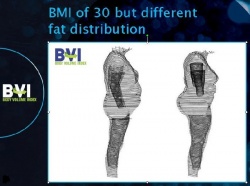Body Volume Index (BVI) measurement launched
A new obesity measurement for the 21st Century, which can help identify individuals at risk of illness such as heart disease, strokes and diabetes, has been officially launched this week. The Body Volume Index (BVI), designed by Select Research, uses a 3D white-light scanner to calculate risk factors associated with a person's body shape and type, through analysis of weight and body fat distribution.


Ian Nabney, Professor of Computer Science at Aston has led research on body composition analysis for the Body Volume Index, which is proposed as a new benchmark for healthcare and a replacement for the Body Mass Index (BMI). BMI is the current recognised standard for measurement of the human body for obesity, which is based solely on height and weight.
The Aston research team has analysed data from multiple sources to produce ‘norms’ for fat in clinically-relevant parts of the body, taking account of age and gender, and evaluated the effectiveness of the measurement technology.
Professor Nabney said; “The 3D BVI measure enables clinicians to understand more about the distribution of a patient’s fat levels, particularly in the abdominal region which is an important indicator of a patient’s health. This could prove a vital early warning system to help identify individuals particularly at risk of heart disease, strokes, and diabetes.”
Richard Barnes MD at Select Research said; “Most people in the world realise that carrying extra weight around the stomach means that they do have a greater health risk, commonly known in healthcare as central obesity. What BVI now offers the world is a brand new way of measuring the abdominal area which BMI simply cannot do. BMI was never meant to be used as an individual assessment for obesity and we believe that after nearly 200 years, each patient deserves to be measured in a way that takes their own body shape and lifestyle factors into account.”
Aston University has undertaken research work on the Body Volume Index as part of the Body Benchmark Study, an international project designed to develop and validate BVI. This was funded by Advantage West Midlands and the Index Voucher Scheme. The scientific work by Aston follows research undertaken for the study by Heartlands NHS Hospital in Birmingham UK, the National Physical Laboratory (NPL) UK and Mayo Clinic in the US.
21.10.2010





